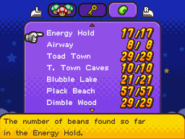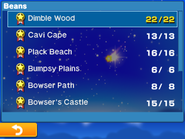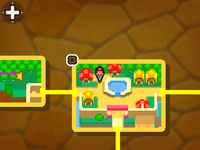Bean
- This article is about an item from the Mario & Luigi series. For the character from Mobile Golf, see Bean (Mobile Golf). For the queen of the Beanbean Kingdom, see Queen Bean.
Beans are collectible items that have made an appearance in all Mario & Luigi games to date. Their use varies between games, though they are usually used to increase the stats of characters, and are usually found in marked spots underground on the overworld. Additionally, the Beanish are a race of bean-like people that appear in almost every Mario & Luigi game.
History
Mario & Luigi: Superstar Saga / Mario & Luigi: Superstar Saga + Bowser's Minions
- Main articles: List of beanholes in Mario & Luigi: Superstar Saga, List of hidden blocks in Mario & Luigi: Superstar Saga, List of beanholes in Mario & Luigi: Superstar Saga + Bowser's Minions, List of hidden blocks in Mario & Luigi: Superstar Saga + Bowser's Minions
In Mario & Luigi: Superstar Saga and Mario & Luigi: Superstar Saga + Bowser's Minions, beans are plentiful in the Beanbean Kingdom, though collecting them is entirely optional. Only 99 beans of each type can be carried at once, and their only use is be taken to the Starbeans Cafe, where they can be blended into stat-boosting Bean Juice for Mario and Luigi. There are four kinds of beans in the game; each are acquired in a different way and are used to make certain Bean Juices:

 Woo Beans are green and are usually found after fighting enemies like Beanies, Sharpeas and Troopeas; equipping the Game Boy Horror SP or using the Advanced Swing Bros. move will guarantee a Woo Bean after fighting these enemies. They can also be obtained by playing certain minigames or completing certain tasks, and can be blended to make Woohoo Blend, Hoolumbian, Chuckoccino and Teeheespresso.
Woo Beans are green and are usually found after fighting enemies like Beanies, Sharpeas and Troopeas; equipping the Game Boy Horror SP or using the Advanced Swing Bros. move will guarantee a Woo Bean after fighting these enemies. They can also be obtained by playing certain minigames or completing certain tasks, and can be blended to make Woohoo Blend, Hoolumbian, Chuckoccino and Teeheespresso.
 Hee Beans are yellow and are awarded as prizes in minigames in Stardust Fields (Border Jump), Hoohoo Mountain (Mysterious Mine Carts), the S.S. Chuckola (Barrel), Little Fungitown (Star 'Stache Smash) and Chucklehuck Woods (Chuckola Bounce). They can be blended to make Hoohoo Blend and Hoolumbian.
Hee Beans are yellow and are awarded as prizes in minigames in Stardust Fields (Border Jump), Hoohoo Mountain (Mysterious Mine Carts), the S.S. Chuckola (Barrel), Little Fungitown (Star 'Stache Smash) and Chucklehuck Woods (Chuckola Bounce). They can be blended to make Hoohoo Blend and Hoolumbian.
 Chuckle Beans are red and are the most common type. They are hidden underground. When Mario and Luigi come across an "X" or some other distinguishing feature on the ground, Mario can perform the Dunk Hammer to pound Luigi underground. By popping out of the ground at the spot of the "X", Luigi will uncover a Chuckle Bean. If Mario is turned into Mini-Mario, a "!" sign will be over his head if there is an invisible Chuckle Bean under him. They can also be obtained by playing certain minigames, and can be blended to make Chuckle Blend and Chuckoccino.
Chuckle Beans are red and are the most common type. They are hidden underground. When Mario and Luigi come across an "X" or some other distinguishing feature on the ground, Mario can perform the Dunk Hammer to pound Luigi underground. By popping out of the ground at the spot of the "X", Luigi will uncover a Chuckle Bean. If Mario is turned into Mini-Mario, a "!" sign will be over his head if there is an invisible Chuckle Bean under him. They can also be obtained by playing certain minigames, and can be blended to make Chuckle Blend and Chuckoccino.
 Hoo Beans are brown and the rarest type. They are found in invisible ? Blocks in seemingly dead end areas. By jumping around, one might uncover one of these blocks, always containing one Hoo Bean. In the remake, these blocks shine for a brief moment upon entering the area and every once in a while; if the Secret Specs are equipped, these invisible ? Blocks appear as outlines, making Hoo Beans slightly easier to collect. Additional invisible ? Blocks containing five or seven Hoo Beans can be found in Joke's End and the Koopa Cruiser after it is repaired. They can also be obtained by playing certain minigames, and can be blended to make Teehee Blend and Teeheespresso.
Hoo Beans are brown and the rarest type. They are found in invisible ? Blocks in seemingly dead end areas. By jumping around, one might uncover one of these blocks, always containing one Hoo Bean. In the remake, these blocks shine for a brief moment upon entering the area and every once in a while; if the Secret Specs are equipped, these invisible ? Blocks appear as outlines, making Hoo Beans slightly easier to collect. Additional invisible ? Blocks containing five or seven Hoo Beans can be found in Joke's End and the Koopa Cruiser after it is repaired. They can also be obtained by playing certain minigames, and can be blended to make Teehee Blend and Teeheespresso.
During the battle with Queen Bean, she spits out a bean when both of her arms are degenerated, which needs to be jumped over. If Mario and Luigi stomp on the bean, it will spawn a Beanie.
Mario & Luigi: Partners in Time
- Main article: List of beanholes in Mario & Luigi: Partners in Time
Template:Quote2 In Mario & Luigi: Partners in Time, Beans are dug up by Baby Mario and Baby Luigi when they use the Baby Drill technique or can be won from the minigames in Thwomp Caverns. These can be traded to Fawful in his shop, Fawful's Bean 'n' Badge, for Badges. The Beans in this game bear a resemblance to Hee Beans, although they are never actually given any name other than "Bean".
The first time the player activates the menu after getting a Bean, Stuffwell will break in and explain where the player can see the number of Beans collected.
Mario & Luigi: Bowser's Inside Story / Mario & Luigi: Bowser's Inside Story + Bowser Jr.'s Journey
- Main articles: List of beanholes in Mario & Luigi: Bowser's Inside Story, List of beanholes in Mario & Luigi: Bowser's Inside Story + Bowser Jr.'s Journey
- “The rumor is, if one uses these mysterious blue... One will grow a little bit! In a statistical sense, so to speak.”
- —Toadsworth, Mario & Luigi: Bowser's Inside Story
In Mario & Luigi: Bowser's Inside Story, beans are optional and can boost stats. These beans are called Heart Beans (which adds a point to the player's HP), Special Beans (which adds a point to the player's SP), and Power Beans (which adds a point to the player's attack power). An Emoglobin in the Energy Hold, a Toad in Toad Town, and Toadsworth in the Toad Square provide information about beans.
The star menu allows the player to see how many beans they have collected as well as the total number of beans in each area. It also allows the player to use beans in the consumable item list where they are categorized by bean type. There are 251 beans in the whole game. Most of them are collected from beanholes – flashing dots underground in Bowser's body (X-shaped symbols in the remake) and X-shaped bean symbols on the ground of the overworld – by using Drill Bros. and jumping out. A small number of them can be collected from characters by doing sidequests: 15 from PR Toad, and 39 from Kuzzle.
An oversized Bean appears as a healing item for Crawfuls, and also an attack used by Magifoofas.
In the game's remake, Mario & Luigi: Bowser's Inside Story + Bowser Jr.'s Journey, Defense, Speed and Stache Beans (the last of the three being renamed "Flex Beans") have been added to the game. Multiple beans can be dug up in one drill spot, and some beans are also obtained after defeating the giant bosses. After talking to a certain Toad in Toad Town who gives information about beans, any sections with uncovered drill spots will be marked in the map. Also, the list of dug-up beans can be found in the Records option instead of the Items option in the star menu, although beans obtained from the PR Toad and Kuzzle are no longer counted.
Mario & Luigi: Dream Team
- Main article: List of beanholes in Mario & Luigi: Dream Team
Like in other Mario & Luigi games, beans are a collectible in Mario & Luigi: Dream Team, to the extent they were in Mario & Luigi: Bowser's Inside Story, where they boosted the brothers' stats upon eating them. Beans are marked as Xs in the ground, and upon Mario digging one up gives the player a bean that permanently boosts one of the brother's stats by one stat point. Unlike the earlier games, there are Beans for all of the stats rather than just beans for Power, HP and SP (which was changed back to BP as of this game).
Beans are only dug up in the Real World. If the player pauses the game and goes into the Beans section in the Collection Menu, they can find a list of all the areas with beans and how many they've found and how many there are in each area. Beans can also be gained from equipping the Wellington Boots/Farmer Boots, which may turn coins into bean drops. There are a total of 143 beans that can be dug up in the game, with there being 24 of each bean (with the exception of Speed Beans, which there are 23 of) to find.
There are also DX versions of each bean, which increase its respective stat by 3 when used. These can be obtained by completing Kylie Koopa's photo puzzles or defeating Gold Beanies. One Heart Bean DX is also obtained after completing the trading quest in Wakeport.
 Heart Beans: Pink beans that increases a bro's HP.
Heart Beans: Pink beans that increases a bro's HP. Bros. Beans: Green beans that increases a bro's BP.
Bros. Beans: Green beans that increases a bro's BP. Power Beans: Orange beans that increases a bro's POW.
Power Beans: Orange beans that increases a bro's POW. Defense Beans: Silver beans that increases a bro's DEF.
Defense Beans: Silver beans that increases a bro's DEF. Speed Beans: Blue beans that increases a bro's SPEED.
Speed Beans: Blue beans that increases a bro's SPEED. Stache Beans: Brown beans that increases a bro's STACHE.
Stache Beans: Brown beans that increases a bro's STACHE.
Mario & Luigi: Paper Jam
- Main article: List of drill spots in Mario & Luigi: Paper Jam
Beans returned in Mario & Luigi: Paper Jam, acting the same way they did in both Mario & Luigi: Bowser's Inside Story and Mario & Luigi: Dream Team. Like in the previous two games, the number of beans collected in each area can be viewed in the menu, this time from the Collection screen. Beans are dug up from X-marked circular spots on the ground and walls, and can be collected with the Trio Drill ability on the overworld. Beans can also be obtained after passing the Know-it-all Toad quizzes. In addition to this, the Wellington Boots return and cause enemies to drop beans when defeated. Finally, countering Petey Piranha's chase attack may give a bean.
DX Beans also return. The Bad Nabbit mission gives the player these beans after each battle with Nabbit, and the Paper Broozers' barrel-throwing attack may sometimes cause one or more of these beans to appear when countered.
Profiles
Mario & Luigi: Dream Team
- Instruction manual description (overworld): "You can get beans by using Mole Mario to tunnel under and jump out of beanholes."
- Instruction manual description (menu): "Raises an attribute of one character by one point."
Names in other languages
| Language | Name | Meaning | Notes |
|---|---|---|---|
| Japanese | マメ[1] Mame |
Bean | |
| Chinese | 豆子[?] Dòuzi |
Beans | |
| German | Bohne[?] | Bean | |
| Italian | Fagiolo[?] | Bean | |
| Portuguese | Feijão[?] | Bean | |
| Russian | Боб[?] Bob |
Bean | |
| Spanish (NOA) | Judía Haba (Since Mario & Luigi: Dream Team)[?] |
Bean | |
| Spanish (NOE) | Judía[?] | Bean |
Trivia
- A Beanish in Beanbean Castle Town says that most of his species are too lazy to search for them, which is why there are so many Chuckle Beans and Hoo Beans scattered throughout the Beanbean Kingdom.
References
- ^ Mario & Luigi: Bowser's Inside Story - From Japanese to English. The Mushroom Kingdom. Retrieved January 10, 2017.
Interwiki links
- Heart Bean / HP Bean — de:Herz-Bohne
- Special Bean / Bros. Bean — de:Brüder-Bohne
- Power Bean — de:Kraft-Bohne
- Defense Bean — de:Abwehr-Bohne
- Speed Bean — de:Tempo-Bohne
- Stache Bean — de:Bart-Bohne



